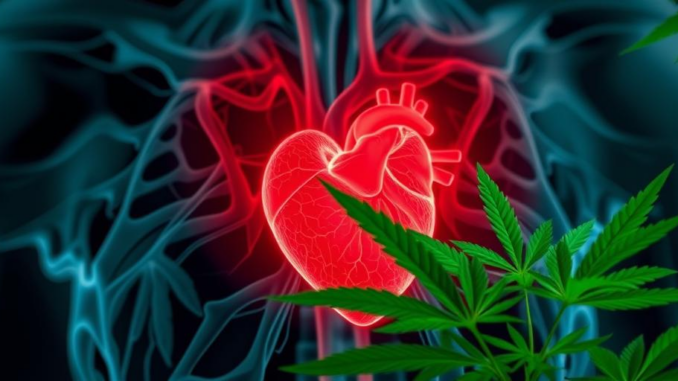
Summary
Studies show a strong link between cannabis use, particularly smoking, and increased risk of heart attack and stroke. The risk increases with frequency of use and is present even in those who don’t use tobacco. This highlights the need for greater awareness of cannabis’s cardiovascular impact and integration of heart health screenings into addiction treatment programs.
** Main Story**
Cannabis use, particularly smoking it, poses a real and significant risk to your heart – increasing the likelihood of heart attacks and strokes. This isn’t just a hunch; it’s the conclusion drawn from multiple studies analyzing data from hundreds of thousands of adults. And the more frequently you use cannabis, the higher that risk climbs. What’s particularly concerning is that this elevated risk persists even if you don’t use tobacco. Let’s dive into the connection between cannabis and cardiovascular problems, because it’s something we really can’t afford to ignore.
The Cardiovascular Dangers of Cannabis
Numerous studies have highlighted the adverse effects of cannabis on your ticker. One retrospective study, for example, found that cannabis users under 50 were over six times more likely to experience a heart attack compared to their non-using counterparts. Crazy, right? And there was another large-scale study involving over 430,000 people. Daily cannabis smokers in that study faced a 25% higher risk of heart attack, and a whopping 42% increased risk of stroke, compared to those who didn’t partake. Even those who only used it weekly saw a slightly elevated risk. A meta-analysis, pulling data from 12 different studies, only confirmed this trend by showing a 50% higher heart attack risk among cannabis users. Its, all pretty concerning.
Researchers point to a few key culprits when explaining these worrying findings. First is tetrahydrocannabinol (THC), the primary psychoactive compound in cannabis. THC can mess with your heart rate, blood pressure, and blood flow. This, in turn, can potentially lead to syncope, stroke, or even a full-blown heart attack. And since smoking is the most common way to consume cannabis, you’re adding another layer of risk. Inhaling particulate matter from smoke exacerbates the problem. On top of that, secondhand cannabis smoke has been shown to cause endothelial dysfunction – which is a precursor to cardiovascular disease. So, yeah, it’s not just about what you’re doing to your own body, but potentially what you’re exposing others to, as well.
Addressing a Growing Health Concern
Cannabis use is on the rise, and with legalization spreading across many states, it’s absolutely crucial that we’re all aware of the potential cardiovascular risks. The research is ongoing, and we’re still figuring out the specifics and long-term effects. But based on what we know now, caution is definitely warranted.
- Open Communication with Healthcare Providers: If you use cannabis, it’s vital to have an honest conversation with your doctor. They need to know, so they can properly assess your cardiovascular health. It’s just part of being proactive about your well being. I know it can be uncomfortable talking about these things, but its vital.
- Integrating Heart Health in Addiction Treatment: Recovery programs should also prioritize heart health. This means screenings and education, recognizing that individuals with substance use disorders often face an elevated cardiovascular risk. Programs like Bright Heart Health, which takes a holistic approach, addressing the psychological, medical, and nutritional aspects of addiction recovery, set a good example, and in my opinion is exactly what we need.
- Public Health Initiatives: Public awareness campaigns need to step up and address the potential cardiovascular risks associated with cannabis use. Accurate information is key to promoting informed decision-making. If people have the knowledge to make the right decisions then they have nobody to blame but themselves.
Recovery and Heart Health
Across the country, addiction recovery programs like those at Calvary Healing Center and NewYork-Presbyterian are offering vital resources and support for those looking to overcome substance abuse, including cannabis addiction. Often, these programs offer a mix of individual counseling, group therapy, medical interventions, and even family support. The goal is to address not only the addiction itself but also any underlying mental health conditions or physical health concerns that might be present. And considering that drug and alcohol addiction can significantly impact heart health, these treatment centers provide a crucial opportunity for people to begin healing both their bodies and minds. It’s a holistic approach that recognizes the interconnectedness of our physical and mental well-being.
Looking Ahead
The connection between cannabis use and cardiovascular issues is something we simply can’t ignore. With cannabis use on the rise and mounting evidence pointing to its detrimental impact on heart health, we need more research, proactive public health strategies, and integrated healthcare approaches. We’ve got to find a way to balance any potential therapeutic benefits of cannabis with the potential risks to heart health. Individuals, healthcare providers, and policymakers all have a role to play. We need to work together to mitigate the negative cardiovascular consequences linked to cannabis use. This means integrating heart health assessments into addiction treatment programs, launching public awareness campaigns, and prioritizing research into the long-term effects of cannabis on the cardiovascular system. Only by addressing these concerns head-on can we hope to protect the heart health of individuals while promoting responsible cannabis use. Don’t you think?


Be the first to comment